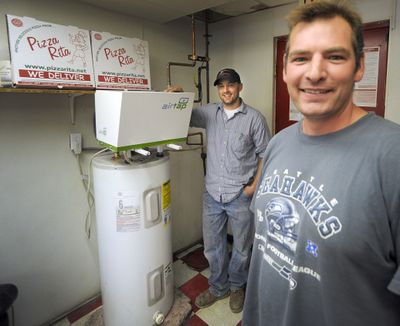A slice of the future?
Will green technology jump-start the slow-moving economy? Some folks are banking on it.

Garry Baumgartner, 34, and Whitney Bendewald, 27, are Spokane plumbers who own Professional Piping Inc. They are guys’ guys who hunt and fish and won’t be trading their trucks anytime soon for hybrid cars. But these two plumbing guys are going green. “We want to be at the front end of new technology,” Bendewald explained. “It makes a lot of sense.”
They do traditional plumbing jobs, but they also install the AirTap – a green technology unit that heats a hot water tank by extracting warmth from the air surrounding it.
They’ve installed seven so far, at a cost of about $1,100 each. A demo AirTap is attached to the hot water heater at Pizza Rita, 502 W. Indiana Ave. Baumgartner’s uncle, Brian Dickmann, owns the place.
The young plumbers believe the technology will allow their customers to save money on their heating bills, and they believe it will help their business grow, too.
Green plumbers? Yup. Just one more example of the growing green “buzz” in the business sector.
This green buzz generates some questions: Will green products and services rev our economy? Will the greening of businesses save the environment? Or is green just another business fad that will fade into oblivion?
No one knows for sure, but meanwhile, business folks are talking a lot of green.
The buzz
Merriam-Webster’s Collegiate Dictionary adds about 100 new words each year. In its 2009 update, green words were red hot.
A green-collar worker, for instance, does work “of, relating to, or involving actions for protecting the natural environment.” At Merriam-Webster.com, readers submit words they hope will make it into the official lexicon; green words abound.
Do you feel green-guilty when you buy or do things that denigrate the environment? Or are you a greenie who is greenin’ every time you turn off an unused appliance?
Look through newspaper, magazine and online ads. Notice how many companies brag about their green initiatives.
In one recent direct-mail advertisement, a television manufacturer proudly boasted that the ads were printed with “100 percent wind energy” and its products certified by the Rainforest Alliance.
A year ago, a United Nations report predicted that the global market for green products and services will double by 2020, and 20 million new jobs will be created in the renewable energy sector alone.
And Cash for Clunkers – in which consumers traded gas guzzlers for more fuel-efficient rigs – was a drive-away success.
Futurists have taken note.
Chris Majer of Spokane, founder and CEO of the Human Potential Project, says: “We have to go green. We don’t have the resources to sustain our throw-away culture. There’s a vast economic opportunity here. The good news is people are paying attention.”
Jonathan Peck, president of the Institute for Alternative Futures in Alexandria, Va., says: “Many business people are recognizing that hey, here’s where the public is moving, here’s what the public wants and there’s stimulus money. And if this is where the money is, I’m going green. This can be a smart business proposition.”
He said some futurists are already looking beyond green to the so-called “yellow” economic force.
What’s yellow?
“Sustainable systems that globalize very quickly and make life better for everyone,” Peck explained in a recent interview.
The buzz kill?
Greenies, beware: Even gung-ho futurists worry about green-economy scammers and schemers.
And economists, tethered to practicality, say “show me the money.”
Richard Schatz, professor of economics at Whitworth University, says green initiatives undertaken just for their public relations value do little for the economy and even less for the environment. (Jargon term: Green-washing.)
For consumer habits to really change, most people must feel pocketbook pain. Schatz believes fuel prices would have to reach about $6 a gallon for the majority of people to embrace plug-in cars.
“Most of us are not driven by voluntary do-goodism,” he said. “We’re driven by self-interest.”
He also wonders about the practical applications of some green products.
For instance, Schatz said people are urged to wash their hands thoroughly in this swine-flu time by singing “Happy Birthday” as they scrub away.
But many office buildings have switched to motion-sensitive, water-saving bathroom faucets, making a Happy Birthday wash extremely frustrating.
“The (faucets) go off after a few seconds, if you ever can get them on,” he said.
Economist Grant Forsyth of Eastern Washington University says the trend toward green products and services won’t be enough to rev the economy. Venture capitalists eagerly pumped up the dot.com bubble of the late 1990s, but they aren’t as eager to invest in high-risk green technology.
“People have clearly moved to a high degree of risk-sensitivity,” Forsyth pointed out. “That might change if the price of oil goes back up.”
But futurists and economists alike applaud the enthusiasm around the greening of business. Economic recoveries require excitement and entrepreneurial innovation.
Companies that ultimately thrive will sell reasonably priced goods that translate to authentic energy savings and conservation, these experts say.
Dickmann, the Pizza Rita owner, is enthusiastic now, too.
“I don’t swallow everything that Al Gore puts out there,” he said. “You have to be skeptical.”
But last week, Dickmann compared his Avista bill for June, July and August of 2008 – when his North Spokane store didn’t have the AirTap – with the same months in 2009.
“We saved $532 over last year,” he said. “Wow.”
The hope of the plumbing guys, Baumgartner and Bendewald, now sits atop a hot water tank in a pizza joint. They invite you to stop in sometime for a slice of their future.